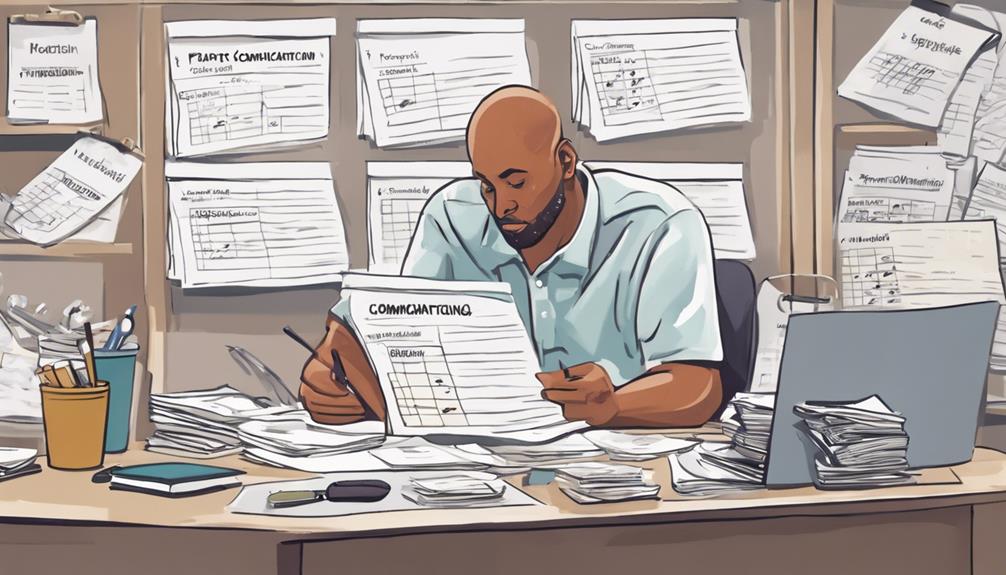Navigating through the challenging waters of divorce while also supporting children can seem like we are exploring unfamiliar territory, but it is a journey that requires carefulness and resilience.
As we strive to be pillars of strength for our little ones, it's imperative to remember that our own emotional well-being matters just as much. With the weight of our own hurt pressing down on us, how do we find the equilibrium to guide our children through the storm?
Let's explore together how we can navigate this delicate balance and emerge stronger, not just for them, but for ourselves as well.
Key Takeaways
- Prioritize self-care to better support children through divorce.
- Seek therapy or counseling to cope with personal hurt.
- Acknowledge and validate your own emotions for healthier parenting.
- Understand that managing personal struggles benefits children's well-being.
Managing Personal Emotions During Divorce
Navigating the emotional rollercoaster of divorce can be daunting, but acknowledging and managing our personal emotions is crucial for our well-being and that of our children. It's essential to recognize the range of emotions we may experience during this challenging time. From sadness and anger to confusion and even relief, it's normal to feel a whirlwind of feelings. However, it's important to remember that our children's needs should come first.
To effectively support our children, we must prioritize self-care and seek out the necessary support. Engaging in activities that promote emotional well-being and reduce stress can help us navigate the emotional challenges of divorce more effectively. While it's important to acknowledge our emotions, we should avoid burdening our children with our personal struggles. Seeking professional help if needed and building a strong support network of friends, family, or a therapist can provide the necessary assistance in managing our emotions while ensuring we meet our children's needs during this difficult time.
Balancing Self-Care and Child Support

Acknowledging the importance of self-care while providing support to our children during divorce is essential for both our well-being and theirs. Balancing the needs of our children with our own is crucial in this challenging time. Prioritizing self-care not only benefits us but also enables us to be more available and understanding for our children as they navigate the complexities of divorce. Taking time for ourselves allows us to recharge and approach the situation with a clearer mind and a more open heart.
Our mental health greatly impacts the well-being of our children, making it vital to address our own emotional needs. Seeking professional help or joining support groups can equip us with the tools necessary to effectively support our children through this process. Remember, by taking care of ourselves, we're better able to provide the love, stability, and guidance that our children need during this difficult time.
Recognizing and Addressing Personal Hurt
Feeling the emotional weight of grief, loss, anger, and confusion during divorce is a common experience that requires acknowledgment and processing before supporting children through this challenging time. When going through a divorce, it can be difficult to balance our own hurt with helping our children cope. Here are some key points to consider:
- Validating Emotions: Recognize that it's okay to feel a range of emotions during this difficult time. By acknowledging and accepting your feelings, you can better support yourself and your children.
- Seeking Support: Consider joining a support group, talking to a therapist, or seeking guidance from a counselor. Having a safe space to express your emotions can be incredibly beneficial.
- Prioritizing Well-being: Remember that taking care of yourself is crucial in order to provide the necessary support for your children. Self-care isn't selfish; it's essential for both you and your kids.
- Understanding Normalcy: Divorce is a challenging process, and experiencing personal hurt is a natural part of it. By understanding that it's normal to feel this way, you can navigate through it while still being there for your children.
Strategies for Self-Healing and Child Support

To support our healing process and effectively aid our children through this challenging time, it's essential to prioritize self-care and seek out therapy or counseling to navigate the emotional complexities of divorce.
Engaging in activities that bring us joy and relaxation can help manage our hurt effectively. It's crucial to lean on a support network of friends, family, or support groups to share our feelings and gain perspective.
Prioritizing our mental and emotional well-being enables us to better support our children through the divorce process. Setting boundaries with our ex-partner is key to maintaining a healthy co-parenting relationship and reducing conflict for the benefit of our children.
Navigating Personal Pain in Co-Parenting
Navigating personal pain in co-parenting involves actively managing emotions while prioritizing the well-being and emotional needs of our children. It's crucial to put our children first during the divorce process, even when dealing with our own hurt feelings.
Here are some key points to consider in this challenging journey:
- Prioritize Children: Make your children's emotional well-being a top priority, setting aside personal pain to support them effectively.
- Effective Communication: Establish healthy communication with your ex-partner to create a supportive co-parenting environment for the children.
- Therapy and Counseling: Seeking therapy can help you process your emotions and develop healthy coping strategies to navigate personal pain.
- Self-Care: Remember that taking care of your emotional well-being enables you to better support and guide your children through the complexities of divorce.
Frequently Asked Questions
At What Age Is a Child Most Affected by Divorce?
We believe that children between the ages of 6 and 11 are most affected by divorce. Their emotional turmoil and struggle to comprehend the situation make this age crucial for providing support and reassurance during such challenging times.
How Can Parents Help Children Cope With Divorce?
We help kids cope with divorce by providing emotional support, reassurance, and stability. Encouraging open communication, validating feelings, and involving them in decisions empower them. Seek professional help if needed and maintain positive co-parenting relationships.
Which of the Following Is Most Important in Helping Children Cope With Divorce?
Encouraging open communication and listening to children's feelings is most important in helping them cope with divorce. Assuring them they're not to blame, establishing stable routines, and seeking professional help if needed are also crucial.
How Do Kids Cope After Divorce?
After divorce, kids cope by expressing emotions through talking, drawing, or play. They may feel sadness, anger, confusion, or anxiety. Supportive relationships with family and friends help, along with stable routines and age-appropriate explanations.
How Can I Manage My Own Emotions While Supporting Children Through Divorce?
It’s important to provide emotional support for kids during divorce by managing your own emotions first. Practice self-care, seek counseling if needed, and communicate openly with your children. Create a stable environment and reassure them of your love and support during this challenging time.
Conclusion
In our journey through divorce, we must remember to be our own lifeboats in the stormy seas of emotions. Just as a lighthouse guides ships to safety, let's illuminate our path to healing and guide our children through the darkness.
Together, we can weather the turbulent waters and emerge stronger on the other side. Let's be the anchors of stability and love for our children as we navigate this challenging chapter in our lives.










